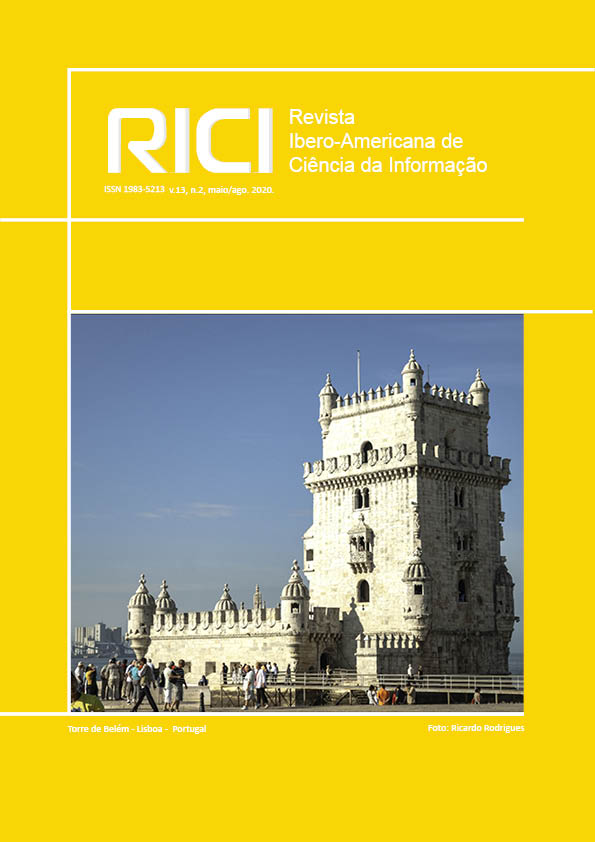Scientific and technological information management: thematic relations of scientific initiation projects at the Federal University of Ceará
DOI:
https://doi.org/10.26512/rici.v13.n2.2020.31095Keywords:
information management. scientific information. thematic relations. knowledge organization.Abstract
The production of scientific knowledge gives interaction between researchers, aiming at the socialization of information, to assist the development of science and technology and to help social development. At the university level, the production of scientific knowledge takes place in several variations. This article deals with relations with the project rights of the Institutional Program of Scientific Initiation Scholarships of the Universidade Federal do Ceará. These positions encourage us to develop research that addresses the following starting questions: Research projects linked to the Institutional Program of Scientific Initiation Scholarships of the Universidade Federal do Ceará have interactions among themselves and allow social relations to be used among communities, including the formation of a scientific knowledge network? Hypothesis: The projects of the Institutional Program of Scientific Initiation Scholarships can generate strategic knowledge that benefits the institution's scientific and technological production through their interactions, to meet the demands of the research. Basic objective: to identify the presence of scientific knowledge networks of the Universidade Federal do Ceará, through the mapping of projects presented as thematic interactions between communities. This is a theoretical-conceptual and methodological research in a descriptive-exploratory research, with quantitative approach, the documentary type for working with scientific projects. The results indicate that the relationship between approaches in scientific projects shows the various possibilities of relationship dynamics between scientific communities. It is concluded that an analysis of the characteristics and intrinsic relationships in the collaborative network can serve as subsidies for communication between researchers who work with related themes, as well as new possibilities for strengthened relationships, such as scientific production and knowledge construction using a scientific information management that includes the relationships between research and its benefits, regardless of the area of concentration.
Downloads
References
BRASIL. Conselho Nacional de Desenvolvimento Científico e Tecnológico. Objetivos do programa PIBIC. Brasília, DF: Conselho Nacional de Desenvolvimento Científico e Tecnológico, [20--]. Disponível em: http://www.cnpq.br/pibic Acesso em: 5 nov. 2019.
BRASIL. Conselho Nacional de Desenvolvimento Científico e Tecnológico. Resolução Normativa 017/2006: bolsas por quota no país. Brasília, DF: Conselho Nacional de Desenvolvimento Científico e Tecnológico, 2007. Disponível em: http://www.cnpq.br/web/guest/view/-/journal_content/56_INSTANCE_0oED/10157/100352 Acesso em: 05 nov. 2019.
COSTA, Airton; PINTO, Adilson Luiz. De bolsista a cientista: a experiência da UFSC com o Programa de Iniciação Científica no processo de formação de pesquisadores (1990 a 2012). Florianópolis: EdUFSC, 2016. 165 p.
CLARIVATE ANALYTICS. Web of Science Group. A pesquisa no Brasil: promovendo a excelência. [S.l.: s. n.], 2019. 42 p. Análise preparada para a CAPES pelo Grupo Web of Science. Disponível em: https://www.sbponline.org.br/arquivos/Promovendo_a_excele%CC%82ncia.pdf Acesso em: 13 set. 2019.
GIL, Antonio Carlos. Métodos e técnicas de pesquisa social. 6. ed. São Paulo: Atlas, 2008.
HAGSTROM, W. O. O controle social dos cientistas. In: DEUS, Jorge Dias de (Org.). A crítica da ciência: sociologia e ideologia da ciência. 2. ed. Rio de Janeiro: Zahar, 1979. p. 81-106.
MARTELETO, Regina Maria. Análise de redes sociais: aplicação dos estudos de transferência da informação. Ciência da Informação, Brasília, v. 30, n. 1, p. 71-81, 2001. Disponível em: http://www.scielo.br/pdf/ci/v30n1/a09v30n1 Acesso em: 17 dez. 2019.
MASSI, Luciana; QUEIROZ, Salete Linhares (Org.). Iniciação científica: aspectos históricos, organizacionais e formativos da atividade no ensino superior brasileiro. São Paulo: Editora Unesp Digital, 2015. Disponível em: http://books.scielo.org/id/s3ny4/pdf/massi-9788568334577.pdf Acesso em: 15 nov. 2019.
MEADOWS, Arthur Jack. A comunicação científica. Brasília: Briquet de Lemos, 1999.
MUELLER, Suzana Pinheiro Machado. O crescimento da ciência, o comportamento científico e a comunicação científica: algumas reflexões. Revista da Escola de Biblioteconomia da UFMG, Belo Horizonte, v. 24, n. 1, p. 63-84, 1995. Disponível em: http://www.brapci.inf.br/index.php/article/view/0000002743 Acesso em: 17 dez. 2019.
TARGINO, Maria das Graças. Comunicação científica: uma revisão de seus elementos básicos. Informação & Sociedade: Estudos, João Pessoa, v. 10, n. 2, p. 37-85, 2000. Disponível em: http://www.brapci.inf.br/index.php/article/view/0000001182/6f78994cb4aa4e65990e1d764d794d5b Acesso em: 15 nov. 2019.
Downloads
Published
How to Cite
Issue
Section
License
Copyright Notice
Authors who publish in this journal agree to the following terms:
- Authors retain copyright and grant the journal right of first publication with the work simultaneously licensed under the Creative Commons Attribution License 4.0, allowing the sharing of work and recognition of the work of authorship and initial publication in this journal.
- Authors are able to take on additional contracts separately, non-exclusive distribution of the version of the paper published in this journal (ex.: distribute to an institutional repository or publish as a book), with an acknowledgment of its initial publication in this journal.
- Authors are permitted and encouraged to distribute their work online (eg.: in institutional repositories or on their website) at any point before or during the editorial process, as it can lead to productive exchanges, as well as increase the impact and citation the published work.
















